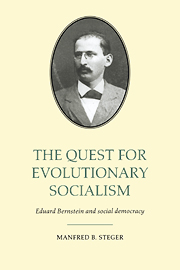Book contents
- Frontmatter
- Contents
- Acknowledgments
- List of abbreviations
- Introduction: the nature of Bernstein's quest
- Part 1 Preparation
- Part 2 Vision
- 4 The meaning of socialism
- 5 Evolutionary socialism as “organized liberalism”: rethinking economics, state, and democracy
- Part 3 Disappointment
- Epilogue: evolutionary socialism at the “end of socialism”
- Select bibliography
- Index
5 - Evolutionary socialism as “organized liberalism”: rethinking economics, state, and democracy
Published online by Cambridge University Press: 06 October 2009
- Frontmatter
- Contents
- Acknowledgments
- List of abbreviations
- Introduction: the nature of Bernstein's quest
- Part 1 Preparation
- Part 2 Vision
- 4 The meaning of socialism
- 5 Evolutionary socialism as “organized liberalism”: rethinking economics, state, and democracy
- Part 3 Disappointment
- Epilogue: evolutionary socialism at the “end of socialism”
- Select bibliography
- Index
Summary
From production to distribution: theories of value
Bernstein's “Kantian” epistemology undermined the “scientific” relationship between Marxist socialism and science in yet another crucial area: political economy. We must remember that Engels had credited Marx's “two great discoveries” – the materialist conception of history and the revelation of the secret of capitalist production through surplus value – with finally transforming “utopian socialism” into a “modern science.” Thus, at the center of the founders' and Bernstein's diverging political and economic conceptions was the role of “value” in regulating and reproducing the social structure of capitalism. However, this did not mean that Bernstein advocated a total rejection of Marxist economic theory. True to his “eclectic” leanings, Bernstein once again presented his views on political economy as a “compromise” position designed to incorporate elements from both Marx's “objectivist” labor theory and the “subjectivist” marginal utility theories of British and Austrian economists such as Stanley Jevons, Carl Menger, and Eugen von Böhm-Bawerk.
Bernstein cautiously prefaced his remarks on economic theory by denying the disputes raging over the validity of Marx's concept of value a central role for socialist theory. Nonetheless, weighty matters of both political theory and practice were at stake. The labor theory of value had been the starting point of Marx's celebrated “physiology of the bourgeois system” – the scientific analysis of the inner coherence and vital processes of the capitalist system.
- Type
- Chapter
- Information
- The Quest for Evolutionary SocialismEduard Bernstein and Social Democracy, pp. 120 - 148Publisher: Cambridge University PressPrint publication year: 1997



